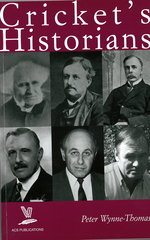Cricket’s Historians
Martin Chandler |Published: 2011
Pages: 342
Author: Wynne-Thomas, Peter
Publisher: ACS
Rating: 4 stars

Cricket’s Historians is a straightforward title for a book, and first impressions suggest it should not give rise to too many misunderstandings about its subject matter. Despite that I have to confess that this splendid work from Peter Wynne-Thomas certainly found its way past the edge of my peripheral vision.
As is always the case in these situations having read the book I am not now entirely sure exactly what I did initially expect, but it was certainly along the lines of a book comprising a number of essays devoted to the likes of Messrs Britcher, Epps, Bentley, Denison, Lillywhite, Haygarth, Alcock, Waghorn, Ashley-Cooper, Thomas, Buckley, Webber, Bowen, Rosenwater, Goulstone, Frindall and perhaps a few others. I did therefore have some concerns by virtue of the fact that, Rowland Bowen and Irving Rosenwater apart, it is difficult to imagine what it might be possible to say about most of those individuals that has not already been said in previous publications.
In 1970 Bowen’s seminal Cricket: A History of its Growth and Development Throughout the World appeared. What you actually get with Cricket’s Historians is, to plagiarise Bowen’s title, a history of the growth and development of cricket research and literature throughout the world. Given the number of volumes that even a basic representative library of the game needs to contain it is perhaps surprising that nothing comparable to this has appeared before. Some narrow aspects have been looked at, the history of Wisden and of the various Lillywhite publications being examples, but never before has any writer attempted to put flesh on the bare bones that the various Padwick bibliographies have given the game.
The story begins with Samuel Britcher and, through twenty essentially chronological chapters, tells the stories of the men, their work and their publications. It is the latter that Wynne-Thomas concentrates on, but there is enough about the inevitable eccentricities of those whose passion is researching the minutiae of the history of cricket for the reader to gain a flavour of their personalities. For some there is more biographical content than others. By necessity that includes the sometimes unholy trinity of Webber, Bowen and Rosenwater, around whose lives and interactions the right writer could surely create a wonderful situation comedy. That observation made Wynne-Thomas is not a man to court controversy, and he skilfully manages to negotiate their peccadilloes in such a way that I doubt that there will be the slightest twitching, let alone turning, in any of their graves.
I have been collecting cricket books for many years, and while I am no Rosenwater my collection does rather dominate my home. I would therefore think I am pretty typical of those who will buy the book. For my part I thoroughly enjoyed reading Cricket’s Historians, so much so that it rather spoiled some other plans that I had for the weekend after its arrival. Despite that the knowledge I have gained through poring over dealer’s and auctioneer’s catalogues, and of course the various Padwicks, meant that I did not actually learn very much I did not already know, but the book is so well written that hardly seemed to matter. And that is the rather perverse thing about Cricket’s Historians. Those who find its contents the most attractive will actually be the ones who benefit least from it. Whereas those who are not collectors, but merely have an interest in cricket, and books and bookishness, will learn almost everything they need to know.
If I had to level a criticism at the book it might be that it devotes a little too much space to the modern era, and perhaps concentrates rather more than necessary on the activities and the membership of the ACS. The lengthy appendix containing a complete list of the Association’s many publications certainly struck me as superfluous. That said I must not forget that it is because the Association exists that the book, and many other good ones, have been written, and I must be careful not to open myself up to accusations of Bowenesque throwing of toys out of the pram as a consequence of my disappointment at not being one of the lucky purchasers whose names came out of the hat when the 35 copies of the de luxe limited edition were allocated – Archie will understand.
So subject to that one tiny caveat I would unhesitatingly recommend Cricket’s Historians, and not just to the likes of Archie Mac. This book merits a place in the bookcase of anyone with an interest in cricket history and cricket writing, irrespective of whether or not they have the means, desire or intention of becoming a true cricket tragic.






Leave a comment